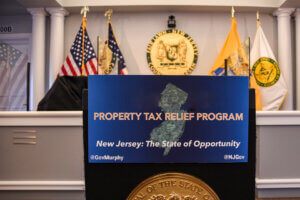Pension reform is one of four key issues being addressed by the legislature’s special committees on property taxes. Prior polls conducted by the Monmouth University Polling Institute have extensively addressed the various proposals for school funding, municipal consolidation, tax shifting and constitutional change. With details of the committees’ recommendations set for release this week, the latest Monmouth University/Gannett New Jersey Poll examines voter support for five key pension and benefit reform proposals.
Of the five ideas covered in the survey, the current poll found overwhelming support for one, majority support for three, and a split decision on one. The no-brainer of the group is yanking state pension eligibility from any official who is convicted of public corruption, regardless of their years of service. New Jersey voters support this measure by a nearly 6-to-1 margin – 81% for to 14% against.
Two other proposals have nearly 2-to-1 approval among Garden State voters. Fully 60% support limiting the pension calculations for public employees with multiple jobs to only one of those jobs compared to 34% who oppose this measure. Another idea which would place all newly hired government workers into a defined contribution benefit plan, while maintaining the pension system for existing employees. This so-called “two-tier” system receives support from 53% of voters to 28% who are opposed, with a relatively large number (19%) of voters who are unsure of where they stand on this idea.
A majority of voters also support having state workers contribute more to their health benefits package, specifically by paying 10 percent of their premiums and increasing co-pays from $5 to $10. The poll found 54% support this compared to 40% who oppose this plan.
“In our other property tax polls, we measured public support for various ideas as a product of their potential to significantly reduce property taxes,” remarked Patrick Murray, director of the Monmouth University Polling Institute. “However, public support for these pension reform proposals exists regardless of the savings they generate. New Jersey favors these ideas fundamentally as good government measures.”
The only issue in the poll which garnered mixed reviews from voters is “not allowing public employees to increase their salaries late in their careers just to increase their pensions.” The poll found 45% in favor of this idea to 48% opposed. However, Monmouth University pollsters speculate that this level of support reflected some respondents’ belief that a certain level of late-career pay increase could be justified in any public or private field.
Murray elaborated, “A poll we conducted last year indicated that 67% of New Jersey voters support placing a cap on the amount of any pay increase that goes into a state worker’s pension calculation.”
Examining the poll results by partisan affiliation, independents are most supportive of limiting multiple job employees to a single job pension (68% to 28%). Also, Republicans and independents alike tend to be more supportive of a two-tiered retirement system (R 58-19%; I 59-26%) and increasing health benefit contributions (R 60-34%; I 59-37%). Democrats support the two-tiered system by a smaller 45-36% margin and in fact oppose increasing health benefit contributions by 49-43%.
The latest Monmouth University/Gannett New Jersey Poll was conducted by telephone with 638 New Jersey registered voters November 1-3, 2006. This sample has a margin of error of ± 3.9 percentage points. The poll was conducted by the Monmouth University Polling Institute and originally published by the Gannett New Jersey newspaper group (Asbury Park Press, Courier-Post, Courier News, Daily Journal, Daily Record, Home News Tribune, and Ocean County Observer). Monmouth University graduate student Joshua Cohen contributed to this release.
DATA TABLES
The questions referred to in this release are as follows:
(* Some columns may not add to 100% due to rounding.)
Now, I’m going to read you a few quick items on potential reforms to the state pension system – this is the system that provides benefits for government and school workers in New Jersey. For each reform, please tell me whether you support or oppose it.
A. Not allowing public employees to increase their salaries late in their careers just to increase their pensions.
|
TOTAL | Dem | Ind |
Rep | |
| Support | 45% | 43% | 46% | 46% |
| Oppose | 48% | 51% | 49% | 44% |
| Don’t Know | 7% | 6% | 5% | 10% |
| Unwtd N |
638 | 186 | 260 |
173 |
B. Having all newly hired government employees use a 401-K type plan rather than receive a set pension when they retire.
|
TOTAL | Dem | Ind |
Rep | |
| Support | 53% | 45% | 59% | 58% |
| Oppose | 28% | 36% | 26% | 19% |
| Don’t Know | 19% | 18% | 15% | 22% |
| Unwtd N |
638 | 186 | 260 |
173 |
C. Limiting public employees with multiple jobs so that they are eligible for a pension from only one of those jobs.
|
TOTAL | Dem | Ind |
Rep | |
| Support | 60% | 51% | 68% | 59% |
| Oppose | 34% | 44% | 28% | 30% |
| Don’t Know | 6% | 5% | 4% | 10% |
| Unwtd N |
638 | 186 | 260 |
173 |
D. Making state workers contribute more for their health benefits, such as paying 10 percent of their premiums and increasing co-pays from $5 to $10.
|
TOTAL | Dem | Ind |
Rep | |
| Support | 54% | 43% | 59% | 60% |
| Oppose | 40% | 49% | 37% | 34% |
| Don’t Know | 6% | 7% | 4% | 6% |
| Unwtd N |
638 | 186 | 260 |
173 |
E. Taking pensions away from any public employees who are convicted of corruption or misuse of their office, regardless of their years of service.
|
TOTAL | Dem | Ind |
Rep | |
| Support | 81% | 73% | 86% | 83% |
| Oppose | 14% | 20% | 10% | 13% |
| Don’t Know | 5% | 7% | 4% | 4% |
| Unwtd N |
638 | 186 | 260 |
173 |
Results for this Monmouth University/Gannett NJ Poll are based on telephone interviews conducted by the Monmouth University Polling Institute on November 1-3, 2006 with a statewide random sample of 638 New Jersey registered voters. For results based on the total sample, one can say with 95% confidence that the error attributable to sampling has a maximum margin of plus or minus 3.9 percentage points. Sampling error increases as the sample size decreases, so statements based on various population subgroups, such as separate figures reported by gender or party identification, are subject to more error than are statements based on the total sample. In addition to sampling error, one should bear in mind that question wording and practical difficulties in conducting surveys can introduce error or bias into the findings of opinion polls.
Click on pdf file link below for full methodology and results by key demographic groups.




